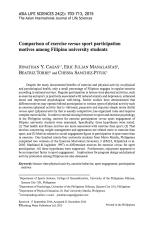Abstract:
Despite the many documented benefits of exercise and physical activity on physical and psychological health, only a small percentage of Filipinos engages in regular exercise according to national surveys. Regular participation in leisure-time physical activities, such as exercise and sport, is positively associated with reduced anxiety and depression, enhanced mood and improved psychological well-being. Earlier studies have demonstrated that different motives may operate behind participation in various types of physical activity such as exercise (physical activity that is volitional, purposive and requires simple motor skills) versus sport (physical activity that is usually competitive, has organized rules and requires complex motor skills). In order to extend existing literature on sport and exercise psychology in the Philippine setting, motives for exercise participation versus sport engagement of Filipino university students were examined. Specifically, three hypotheses were tested: (1) That health and fitness motives are more associated with exercise than sport; (2) That motives concerning weight management and appearance are related more to exercise than sport, and (3) Motives related to social engagement figure in participation in sport more than in exercise. One hundred ninety-four university students from Metro Manila, Philippines completed two versions of the Exercise Motivation Inventory 2 (EMI-2, Kilpatrick et al. 2005, Markland & Ingledew 1997) to differentiate motives for exercise versus for sport participation. All three hypotheses were supported. Furthermore, enjoyment appeared to be an important factor in sport engagement. Implications for program design and physical activity promotion among Filipinos are also discussed.


